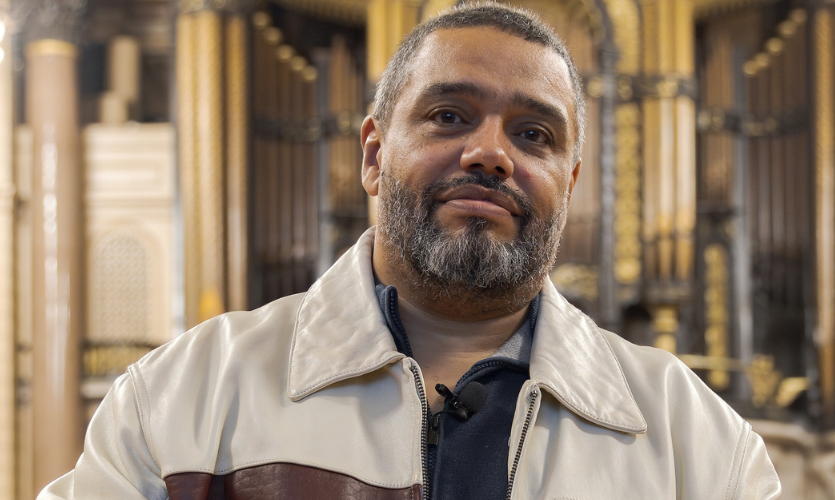Campaign highlights the success stories of first in their family students to attend university

LJMU is supporting a new national campaign, led by Universities UK (UUK), that is highlighting the extraordinary success of students who were the first in their families to attend university.
UUK’s ‘100 Faces’ campaign aims to champion and celebrate the positive impact of ‘first-in-the-family’ (FitF) graduates in the UK to highlight the need for access to support and ensure the next generation can reach their graduate potential.
Among the 100 people featured in the campaign is Malik Al Nasir, an author, poet and academic from Liverpool who studied new media production at LJMU, and has also graduated from Liverpool’s other two universities.
Malik is included in the campaign under the category of influential voices, demonstrating how universities across the UK have helped to develop first generation students into leaders in politics, law and advocacy, ensuring that there is fair representation and varied voices in some of the most influential parts of society.
Malik’s story
From the age of 9 to 18 Malik grew up in care. By 18 he says he was left traumatised, semi-literate, homeless and destitute. A turning point came with a chance meeting with poet and activist Gil Scott-Heron at Liverpool’s Royal Court Theatre in 1984. Scott-Heron became a mentor, inviting Malik to tour with him and encouraging him to return to education and to use poetry as the vehicle to become literate.
Malik got a job at sea working on ferries and tankers, all while teaching himself to read and write, sending Gil poems at each port he would stop at. In 1990, he joined Littlewoods, a retail chain and football pools company founded by Sir John Moores, whom LJMU is named after, on their pioneering positive-action scheme which enabled him to go to college one day a week and then eventually on to study at university.

He is now an acclaimed researcher and author. His memoir, Letters To Gil, documented his childhood experiences and then in tracing his ancestry back to Demerara, Malik has established himself as a renowned researcher into Britain’s role in the slave trade.
In 2023, Malik returned to LJMU to deliver a Roscoe Lecture, exploring the history of the abolitionist William Roscoe – after whom the LJMU lecture series is named - and his financiers who were slave traders.
Malik works closely with UK universities and other organisations to develop policy around widening access and decolonisation and has made representations to the UN on lifting the barriers to Black academia. He is currently reading for a PhD in history at the University of Cambridge on a full Economic and Social Research Council (ESRC) scholarship.
UUK’s ‘100 Faces’ campaign ambitions
Other familiar faces featured in the campaign include England footballer Beth Mead, Lord David Blunkett, Nobel Prize winner Sir Chris Pissarides and actor Amit Shah.
As part of the campaign, new research reveals the transformative impact of going to university on ambition (74%), with almost three quarters (73%) of FitF students agreeing their degree gave them the confidence to apply for jobs without feeling like an imposter.
The research also highlights FiF students’ reliance on depreciating financial support - without financial support, over 4 in 10 FitF graduates couldn’t have afforded to go to university at all. This is equivalent to around 1.1 million 24–40-year-olds in England and Wales.
With financial provisions dwindling and the cost of living rising, UUK is calling for government to reinstate maintenance grants and increase support for future students.
These findings come from extensive new research, commissioned by Universities UK, into the experiences of 6,004 UK graduates and 4,006 non-graduates, aged 24-40, from across the UK.
The success of students like Malik is testament to the extraordinary role university can play – particularly for those students who are the first in their family to attend and face significant barriers before they even set foot on campus.
Widening participation at LJMU
LJMU is committed to reducing the gaps in higher education when it comes to the under-representation of particular groups. The Outreach Team delivers a suite of programmes designed to promote fair access to education, providing opportunities to engage with the university and offer support for individuals with advice and guidance relating to their higher education choices.
The university is proud of serving its local community as an institution of and for the region, supporting large numbers of people from Merseyside and the wider North West area to seek out opportunities for themselves through study at LJMU.
UUK Chief Executive commentary
UUK is campaigning to highlight the achievements of the extraordinary first in family graduates in every community, and to ensure that future generations don’t miss out on the transformative impact of a university education.
Vivienne Stern MBE, Chief Executive of Universities UK, commented: “There are those who say that too many people go to university. I disagree. These stories tell you why. In this country you are still twice as likely to go to university if you are from the wealthiest background, compared to the least wealthy. That’s not right.”
She added: “The experiences of students who are the first in their families to have been to university tell a powerful story. I am amazed by how many graduates talked about having imposter syndrome – and the way that earning a degree helped to banish that feeling. I believe we have a responsibility to keep working to ensure a wider range of people in this country get access to the potentially transformative experience of going to university. For that to happen, we really do need to see an improvement in maintenance support to support those from the least privileged backgrounds.”
More on the campaign can be found on the Universities UK website.


